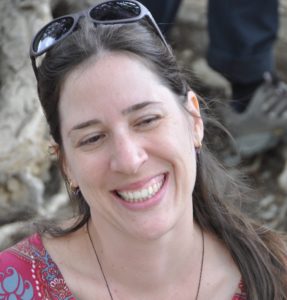Alice Ramos de Moraes
About
 I was born in Campinas, São Paulo state, and grew up in close contact with the beauty of the Atlantic Forest by the shore of southeastern Brazil. No wonder I decided to study Biology at the University of Campinas – UNICAMP (2000 – 2003) – where I also took a Master’s degree in Ecology by studying tritrophic interactions involving ants, caterpillars and the host plant (2004 – 2006). Realizing that I needed new professional experiences, I decided to put my academic studies on hold and had the opportunity to work as a consultant and as an Ecology teacher for some years. A few years later, in 2014, I started my doctoral studies in Ecology, still at UNICAMP but now working with social-ecological systems and resilience frameworks. My research interests also include ecosystem services and human well-being (especially cultural services), community-based conservation and local development, ecosystem stewardship, participatory research methods. In addition to my work, I personally cherish my family and friends, good social relations based on cooperation and trust, nature, doing sports and cultivating my spiritual values.
I was born in Campinas, São Paulo state, and grew up in close contact with the beauty of the Atlantic Forest by the shore of southeastern Brazil. No wonder I decided to study Biology at the University of Campinas – UNICAMP (2000 – 2003) – where I also took a Master’s degree in Ecology by studying tritrophic interactions involving ants, caterpillars and the host plant (2004 – 2006). Realizing that I needed new professional experiences, I decided to put my academic studies on hold and had the opportunity to work as a consultant and as an Ecology teacher for some years. A few years later, in 2014, I started my doctoral studies in Ecology, still at UNICAMP but now working with social-ecological systems and resilience frameworks. My research interests also include ecosystem services and human well-being (especially cultural services), community-based conservation and local development, ecosystem stewardship, participatory research methods. In addition to my work, I personally cherish my family and friends, good social relations based on cooperation and trust, nature, doing sports and cultivating my spiritual values.
Place
São Luís do Paraitinga is a small municipality (10,000 inhabitants) located on Eastern São Paulo State, on the Atlantic Forest Biome, on the mountains called “Serra do Mar”, near the coast. It’s a cultural/architectural heritage site, as well as a natural one, and most of its population is known as caipira (rural people). The main economic activities relate to agriculture and cattle raising, however tourism has become an alternative more recently. The Chapéu River catchment is located in the rural area of São Luís do Paraitinga, right next to an important Atlantic Forest reserve – the Serra do Mar State Park. The catchment’s landscape is a mosaic of different land uses, comprising areas of native and recovered vegetation, pastures, eucalyptus plantations and small-scale agriculture, and it’s legally considered a priority site within the state for the restoration of riparian forests. The Chapéu River is the main tributary of the Paraitinga River, which, in turn, joins the Paraibuna forming the Paraíba do Sul, a very important river of southeastern Brazil. Its catchment, known as the Paraíba Valley, comprises 180 cities in 3 states, and around 15 million people depend on its water. In this context, research efforts may focus on the governance of local social-ecological systems, social learning, community conservation and stewardship, and the relationship between culture and conservation, in order to generate information to contribute to community empowerment and participation in land use management.
Research
During my PhD research, I aim at understanding the feedbacks that affect the quality of ecosystem services at a rural watershed (the social-ecological system) in the municipality of São Luís do Paraitinga, São Paulo State. By doing that I intend to foster ecosystem stewardship practices among the stakeholders, through participatory methods, in order to strengthen or maintain social-ecological resilience. There’s already a big body of knowledge regarding biophysical and social aspects of that region, upon which my PhD project was built. As a member of the Commons Conservation and Management Research Group (CGCommons), I have participated in outreach activities in the rural community of Catuçaba district, in the same municipality. Such activities involved the development of learning groups in integrated conservation and development initiatives, facilitation of community’s meetings and finally collaborative work for community’s organization and mobilization. Even though the project officially ended in 2014, its consequences on the community are still visible. Currently, I am a very enthusiastic participant in the community’s learning processes as a learner, as a part of the process. I also seek to foster and be part of the community’s learning process regarding more sustainable land use and management practices, which may enhance ecosystem services provision and ultimately, human well-being. I am also very fond of working as “cross-pollinator” among different stakeholders, bridging gaps whenever possible so that they can get in touch with each other and work together to achieve common goals.
Key Publications
- MORAES, A. R.; GREENEY, H. F.; OLIVEIRA, P. S.; BARBOSA, E. P.; FREITAS, A. V. L.. Morphology and behavior of the early stages of the skipper Urbanus esmeraldus on an ant-visited host plant, Urera baccifera. Journal of Insect Science (Online), v. 12, p. 52, 2012.
- SEIXAS, C. S.; FARINACI, J.; DIAS, A. C.; MORAES, A.; ISLAS, C. A.; ARAUJO, L.; RIBAS, N.; CHAMY, P.; UMMUS, R.; FREITAS, R.; SANCHES, R.. Commons management and conservation on the ground: learning from interactions between science and practice. In: 15th Biennial Global Conference International Association for the Study of the Commons, 2015, Edmonton, Canada. IASC 2015 Book of Abstracts. Edmonton, 2015. v. 1. p. 1-339.
- UMMUS, R.; MORAES, A.; RIBAS, N.; LIMA, A.; FARINACI, J.; SEIXAS, C.. Transformations in social-ecological systems management in Brazil: potentials, constraints and cross-scale interactions. In: Transformations 2015 – People and the Planet in the Anthropocene, 2015, Stockholm, Sweden. Transformations 2015 Book of Abstracts. Stockholm, 2015. v. 1. p. 11-30.


